The decompression of ERB's psychology from
his first book, The
Princess Of Mars had progressed quite a ways by 1914. He
was writing out his frustrations. He had written eight books or stories
in 1913, each addressing a particular aspect of his problem. He would
write seven more in 1914 followed by six in 1915. After that his
repressed emotions had been largely freed. His writing would turn
from release to the business of writing.
The length of time it took him to write Farris's
would indicate a certain amount of trauma that it was difficult for him
to vacate. All of Burroughs' books reflect his life but Farris's
may have been more painfully autobiographical.
While this short book was begun in July of
1913 it was not finished until March of 1914, almost nine months -- the
period it takes to be born or possibly reborn. While he was working
on this book Burroughs wrote and completed the following: The
Mucker, The Mad King
Of Lutha, Nu Of The
Neocene, The Beasts
Of Tarzan, and The
Lad And The Lion, thus the Girl
From Farris's brackets these five novels. It follows that
they must all be related to the themes of Girl From Farris's although
I am not prepared at this time to relate them.
The Mucker, Mad King Of Lutha, and Nu
Of The Neocene would all have sequels developing Burroughs psychology
further. The sequel to the Mucker, Out there Somewhere, would
be instrumental in resolving Burroughs' major psychological dilemma while
Mad
King Of Lutha, Nu Of The Neocene, Sweetheart Primeval and Barney
Custer Of Beatrice, Nebraska form a sort of quartet wrestling with
ERB's relationship with his wife, Emma.
So, to the Girl From Farris's.
This was the first of Burroughs' realistic novels. It is also the
first of his Chicago novels. The novel, at least the first two thirds
is very good. A major failing of Burroughs' work is that his books
frequently have a much too hasty and crammed ending. It is as though
he couldn't sustain his interest to the end, or maybe in his mind the climax
came much earlier. The first two thirds, however, are carefully crafted
leading up smoothly to the denouement and then Burroughs more or less just
ends it.
The pivot of the novel is the bashing Ogden
Secor receives at the hands of the burglars in his office. This is,
of course, reminiscent of the bashing
Burroughs received in Toronto in 1899. The incident made an indelible
impression on him. There is at least one comparable bashing usually
several in each novel
We should examine Ogden Secor to see what sort
of composite he is. Obviously one component is Burroughs himself.
The patronymic Secor may refer to his sojourn at Sears when he wrote a
poem extolling Sears Secoro pants. That's about all I've been able
to come up with so far and I don't want to speculate on the psychological
implications of 'pants.' Suffice it to say that Jean Genet uses the prison
term 'to defend one's pants.' This means whether you will be able
to wear them as a 'man' or otherwise in an obviously emasculated fashion.
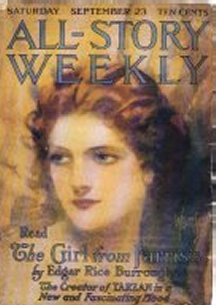 Burroughs had Tarzan
Of The Apes published by McClurg's in 1914 somewhat after Farris's,
which was never published in his lifetime, was written. However it
was published in magazine form in the September-October issues of All Star-Cavalier
Magazine of 1916 so that Burroughs could have rewritten it to include his
experiences with McClurg's during 1914-16.
Burroughs had Tarzan
Of The Apes published by McClurg's in 1914 somewhat after Farris's,
which was never published in his lifetime, was written. However it
was published in magazine form in the September-October issues of All Star-Cavalier
Magazine of 1916 so that Burroughs could have rewritten it to include his
experiences with McClurg's during 1914-16.
By 1916 he would have been very unhappy with
his treatment by the publisher. Certainly after 1926 when Ogden McClurg
met a mysterious death Burroughs seemed to gloat over it.
Let us take a brief look at Ogden McClurg's career.
It is a very interesting career and one the ERB may have envied.
Ogden was the son of Alexander McClurg, who
renamed the firm after himself when he assumed control after the War Between
The States. The firm had been established in 1844. MrcClurg's
was primarily a book store which got into publishing on the side.
As a bookstore it was very successful as bookstores go. Which is
to say that any single store business, no matter how successful, can only
produce a modest income compared to chain stores or industrial companies.
I doubt if Alexander netted more than ten to twenty thousand a year from
it which while good is not fantastic compared to the Marshall Fields and
Palmers or Sears, Roebuck. Besides they kept burning McClurg's out.
Nevertheless Alexander was prosperous enough
to bring Latin tutors to Chicago to educate young Ogden setting the tutors
up as the Chicago Latin School when Ogden had outgrown them.
Ogden went off to college, graduating in 1901
returning to Chicago just after McClurg's had been burned out again.
One shudders to think of those wonderful books going up in flames.
Chicago must have been full of barbarians in those days. Eugene Field
the famous Chicago columnist and bibliophile used it as a clubhouse for
his Saints and Sinners corner. Alexander made an annual buying trip
to England for the rare and beautiful.
Just shows how downright ugly man can get,
burning all those lovely books. The arsonists probably lifted the
choicest volumes before they torched the place. At any rate this
last fire may have been too much for the McClurg's finances. The
company was reorganized after the fire with the shares sold to the employees.
So this was an employee owned company when Ogden returned West from college
with visions of becoming the playboy of the western world in his head.
One imagines the McClurgs retained a large number of shares for themselves
but could no longer use the profits as their own.
Nevertheless Ogden began work as an employee,
being elected President only in 1911. Therefore his income from the
bookstore/publisher must have been too modest to support the lifestyle
of the playboy of the western world. By this time, as the saying
goes, Ogden had been raised to champagne tastes. I have been unable
to learn how much Ogden inherited but it couldn't have been so much that
he couldn't have gone through it in short order, especially as he was one
of the premier sailors on the Great Lakes. He was reputed to have
owned more sailboats than any other Lake sailor. His first wife too
was a great sailor giving Ogden a match made in heaven.
Ogden had a beautiful home in a prestigious
neighborhood. Obviously he needed more money than his income from
the bookstore provided. Ogden was an adventuresome sort. He
joined the Naval Reserve in which he rose to Lieutenant in 1909 when he
inexplicably quit the Navy. Or, is it inexplicable?
Needing more money Ogden became a real estate
developer of the more daring sort. Details of his success are sketchy
but one way or the other real estate development is a front loader with
the return of capital and profits, if any, coming well down the road.
In the meantime Ogden's expenses for his high living kept running.
In Burroughs' Farris's Ogden Secor was
a real estate developer who ran into hard times as a result of his bashing.
If Burroughs rewrote Farris's in 1916 before magazine publication
to include references to Ogden's troubles they could have been motivated
by the, at least, inept handling of Tarzan Of The Apes by McClurg's.
It is absolutely unclear how many copies of Burroughs' magnum opus sold.
There seems to be little evidence to support the claim of millions in the
first couple years. The evidence indicates no more than a million
but then the figures may have been lowered to skim off Burroughs' royalties
which he thought was happening.
Had McClurg's had confidence and promoted the book
correctly it may have sold a million thus allowing Burroughs ten percent
of 1.30 a copy. Even at 1.30 the book seems to have been lowballed
as a price of 1.50 or 2.00 would have been in line with the times.
At 10% of 1.3 million dollars Burroughs would have received the very princely
sum of $130,000. As it was the book was leased to A.L. Burt a discount
house which returned a royalty of 4.9 cents a copy of which McClurg's as
the lessor took half. So if Burroughs had received his share from
a million copies this would only have amounted to $25,000. I would
be angry, how about you?
Now, it is said of Ogden that he participated
in several Latin American revolutions. These were the years of the
organization of the Banana Republics by United Fruit and others.
These were years of US military intervention in the Central American States.
Harold Gray the author of Little Orphan Annie came from Chicago.
His Daddy Warbucks who always struck me as a strange character may have
reflected something of the swashbuckling aura of this era.
To participate in these revolutions Ogden would
have had to have abandoned his Chicago interests. Did he leave the
Navy Reserve to become a secret agent of the US government in Central America?
Thus he would have no official connection to the US government while, one
hopes, he might have been able to gain some wealth from the banana companies
or wherever else he could obtain it as well as his agent's pay.
During this period his first wife died.
Even though he must have been out of Chicago for extended periods of time
he returned to his presidency of McClurg's.
Somehow in this very adventuresome life he
found time to court another woman while back East marrying her in 1916.
This might possibly have been a bad move.
Shortly after the marriage the US entered the
Great War. Now, here's the catch: Ogden left the Navy as a
Lieutenant; he was now reinstated as a Lieutenant Commander being given
very responsible positions which would have required some experience.
He could only have gotten the necessary training to be rewarded with this
promotion as Secret Agent McClurg.
Ogden has a new wife who is now left alone
in Chicago while Ogden goes off to fight the war not returning until 1920.
A woman of means can get pretty independent in that time especially as
she has a husband she barely knows. It could have been inconvenient for
the husband to return. Or perhaps each saw the other with fresh eyes.
At the same time Ogden had been absent from
McClurg's for the several years he was at war plus who knows how much time
when he was in Central America during the Banana Wars.
The early years of the century were now over;
this was the new world of the twenties; previous possibilities had vanished.
The swashbuckling years were over. But, Ogden still had expensive
tastes. The bookstore/publishers could not generate enough wealth
for both Ogden and the employee owners. He could no longer hope to raise
money in Central American adventures.
Still he was a resourceful man. He redirected
Mcclurg's from a bookstore/publisher to a wholesale house selling all sorts
of things, refrigerators, radios, you name it. The book store was
sold to Brentano's in 1923 undoubtedly in order to raise money for the
transition to wholesaler. Still Ogden needed money while the transition
to civilian life and to a homelife with a woman he now scarcely knew must
have been excruciatingly painful. He had to be wondering what had
happened to his life.
In 1926 Ogden participated in a scientific
expedition to Central America. Why would he have been selected by
men he couldn't have known isn't clear. Quite possibly the scientific
expedition was a blind for some espionage and Ogden was once again a secret
agent. The pay must have been good because Ogden could ill afford
to ignore his business and marriage.
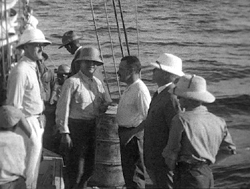
(L-R) Gregory Mason, Ludlow Griscom,
Odgen Trevor McClurg,
Herbert Spinden, Francis Whiting
|
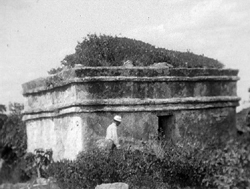
Ogden Trevor McClurg
inspects the shore temple
at Chakalal.
|
Shortly after his return to Chicago, just a couple
months, Ogden died the mysterious death over which ERB might have had some
reason to gloat.
A motorist found his car parked by the side
of the road. Ogden was found lying prostrate in a ditch with his
feet in the water. His head was cushioned by a folded car blanket.
While still conscious Ogden could only mutter: 'I am sick.
I am so sick.' He was taken to an Oak Park hospital where he died
without regaining consciousness.
Who can say how he died. I wonder who
put the blanket under his head?
The denouement of the tale couldn't have been
known by Burroughs in 1916 but I believe that he believed Ogden stole his
royalties for his real estate ventures. One can't know whether he
knew that Joe Bray, his editor at McClurg's was an owner as well as an
employee. It is possible that money was kept from him. It all
depends on how many copies were actually sold but Joe Bray could have been
as guilty or more so than Ogden.
In any event McClurg's who were not really
serious publishers didn't recognize the appeal of Tarzan while they scorned
the genre. I'm sure that they learned their mistake too late.
The story is set in the reform years from the
1905-13 period of ERB's life. The gay old pre-twentieth century days
were about over. The nineteenth century had been a period when vice
and criminals virtually controlled society openly. There was New
York with its Boss
Tweed and Richard
Croker of Tammany
Hall. San Francisco had its Barbary Coast and Chicago its Levee.
The vice districts attempted to segregate their psychological types in
their own areas although the criminals were powerful enough to either influence
or control city governments. Bathhouse
John and Hinky Dink Kenna had a thoroughly corrupt hand on the tiller
of Chicago during the period of this story.
This idea of the story may be based
on the death of Marshall Field II who was shot in a bordello and then removed
to his home to save his reputation.
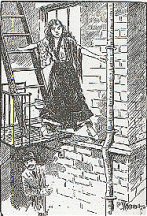 She is escaping from Abe Farris's down a drain pipe in a back alley when
she is pinched by Officer Doarty. An interesting spelling of what
I assume began as Doherty. This Maggie Lynch is rather hard boiled
making no bones about working as a prostitute. In fact she tells
Doarty that she had been offered a better crib at the competing Beverly
establishment rather than saying something like: Thank god officer,
I'm June Latrop from downstate. I've been imprisoned in there.
She is escaping from Abe Farris's down a drain pipe in a back alley when
she is pinched by Officer Doarty. An interesting spelling of what
I assume began as Doherty. This Maggie Lynch is rather hard boiled
making no bones about working as a prostitute. In fact she tells
Doarty that she had been offered a better crib at the competing Beverly
establishment rather than saying something like: Thank god officer,
I'm June Latrop from downstate. I've been imprisoned in there.
Here the name of the Beverly bordello is very
close to the real Everleigh
bordello which was one of the most famous houses in Chicago.
It too was closed down about this time.
Abe hadn't put her to work so she should have
been innocent of any wrong doing believing herself to be married to John
Secor, bigamously perhaps, but still legitimately married in a church.
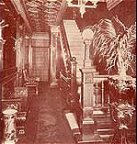
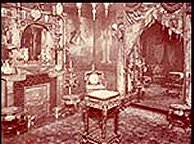
Chicago's Everleigh Bordello: Entrance and Japanese
Parlour
She maintains the image of the prostitute-
golden hearted to be sure- throughout the book until the last few pages
when she shed her hard boiled aspect becoming nearly virginal.
Doarty nevertheless pinches her and her case
is put on the docket as the murderer of John Secor.
The pages concerning ERB's discussion of the
grand jury system were probably written early in the composition say, August
of 1913. During his years of excruciating headaches and floundering
around to find himself, as should be clear, ERB was not idle. He
was alert, observant and studying his world. His discussion of the
Grand Jury system is intelligent and as cogent then as it is today.
Some things never change:
"And the worst of it
is," said one of the younger members of the panel, (possibly ERB
himself) "it's all so utterly futile. When I was summoned as
a grand juror I had a kind of feeling that the state had placed a great
responsibility upon my shoulders, that she had honored me above other men,
and placed me in a position where I might help to accomplish something
really worth while for my fellow man."
One of the bank presidents
laughed.
"And the reality you
find to be quite different, eh?"
"Quite. I hear
only one side of a string of sordid, revolting stories, and I hear nothing
more than the assistant State attorney wishes me to hear. There are
momentous question stirring the people of the city, but when we suggest
that we should investigate the conditions underlying them we are told that
we are not an investigating body- that those questions are none of our
business unless they are brought to our attention through the regular channel
of our State Attorney's office. We are told that the judge who charged
us to investigate these conditions had never charged a grand jury before,
and while doubtless he meant well he didn't know what he was talking about."
"I understand," said
another juror, "that we will get our chance at the vice problem today 'through
the regular channel'- the Abe Farris case is on the docket for this afternoon."
"And what will we do?"
asked the young man. "We'll listen to such questions as the assistant
State attorney sees fit to ask, and if we start asking embarrassing questions
he'll have the sergeant-at-arms hustle the witness out of the jury room.
Then we'll hem and haw, and end up by doing whatever the assistant State
attorney wants us to do. We've done it on every important case- you
watch."
It's hard to believe that ERB wasn't called
as a grand juror, that this isn't a first hand experience. That was
the way things were done then, it is the way things are done today and
it is the way things have always been done. It is always good to
have the truth pointed out to us, basically ERB was wasting his breath,
but he was right.
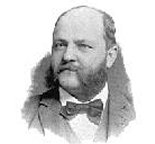 The hearing allows ERB to introduce one of the reformers, the Rt. Reverend
Theodore Pursen. Well, if you're going to castigate the 'democracy'
you might as well hit out at the reformers too. These were the days
of Anthony
Comstock who was running down criminal uses of the mails. The
Comstocks of the world are good men doing a thankless job. They are
usually excessive in their zeal,at least their critics whose activities
are threatened characterize them a such. As a bystander watching
the combatants I would rather see the Comstocks of the world triumph than
the criminals but the crooks always seem to be able to nail the Comstocks
pretty good.
The hearing allows ERB to introduce one of the reformers, the Rt. Reverend
Theodore Pursen. Well, if you're going to castigate the 'democracy'
you might as well hit out at the reformers too. These were the days
of Anthony
Comstock who was running down criminal uses of the mails. The
Comstocks of the world are good men doing a thankless job. They are
usually excessive in their zeal,at least their critics whose activities
are threatened characterize them a such. As a bystander watching
the combatants I would rather see the Comstocks of the world triumph than
the criminals but the crooks always seem to be able to nail the Comstocks
pretty good.
The Reverend Dr. Parkhurst of New York was
still active at this time too. He, too, had been vilified for his
attempts to clean up his city. You sit in a history class today and
the prof will invariably side with the criminals against the reformers.
I had my troubles in school. Burroughs rips up Pursen pretty good too so
I don't know who's side he was on in this argument. Injured innocence,
I guess, whatever that is.
At this juncture the story is moved forward
when Ogden Secor, a juror, sees something of value in young Mag.
In awe at his innate virtue Maggie decides to go straight as he suggested.
She was supposed to meet him but she lost his name.
Nevertheless she does go straight although she has
to avoid terrible temptations. Check out what she rejected:
"Hah! What does
(May Beverly) care? She ain't got no love for Farris, and besides
a chicken with an angel face like yours can get in anywhere in this burg.
But on the dead, Mag, you're a boob not to get your hooks onto some rich
gazimbo. I know a gink right now that'll pass me out five hundred
bones for a squab like you. Say the word and I'll split with you."
The girl looked
at the man for a moment, and then turned and gazed out the window.
"That's right; think
it over," said Eddie. "It's a good proposition and that ain't no
dream. He's not exactly pretty, but he's there with a bundle of kale
that would choke the Panama. He'd set you up in a swell apartment,
plaster sparklers al over you and give you a year-after next model eight-lunger
and a shuffer. You'd be the only cheese on Mich. Boul."
How's that for slang. Bunch of people
I know couldn't understand it. Imagine what's going to happen to
the language when the English as a second language crowd meets that.
Whole catalogs of literature are going to slide into the abyss. It'll
be like trying to read Chaucer in the original. But our young lady
was made of stout stuff. She turned Eddie down and learned stenography
instead so she could get a twenty dollar a week job with the John Secor
Company. Weird huh? ERB skims right over that one.
It was a rough road to the top however.
Check out this exchange after she'd turned down Eddie. She'd been
working for eight or nine dollars a week. The boss calls Mag into
his office:
"I have been noticing
your work-and you." said the man. "I think that you are not getting
enough wages. I believe that we can fix it up so that you can earn
ten dollars a week- how would that strike you?"
The girl's eyes narrowed but
the man did not notice.
"I should be glad if
I could earn ten dollars a week," she replied.
"Well, suppose you take
dinner with me tonight and we'll talk it over- I'm too busy just now.
Well, what do you say?"
June looked him straight
in the eyes, and then she laughed. She thought of the apartment on
Michigan Avenue, the eight cylinder touring car, the chauffeur and diamonds-
of all that she had refused seven months ago.
"You poor boob," she
said. "you poor, cheap boob you!"
The man turned scarlet.
He tried to say something, but the words stuck in his throat.
June rose from her chair.
"Give me my time, please.
I've heard there were men like you are. If you had the nerve to come
right out and say what you wanted of me I might at least have had a little
respect for you: but to try to work that old cradle-robbing dinner-game
on me! And offering me ten dollars a week and work all day in the
bindery to boot! Give me my four dollars and let me out of here!"
June must have been taking some English as
a second language course to be able to speak out like that. If you'll
notice her English has improved a great deal since we were introduced to
her at the beginning of the story. Notice also how ERB translates
eightlunger, shuffer, and sparklers for anyone who has been puzzling over
the terms for the last several pages. Nice guy. Altogether
a nice passage, well handled.
June goes to work for the John Secor Company
only to find that she has found Ogden Secor again. He doesn't recognize
her but as she is a whiz as a stenographer he is duly impressed.
Here also ERB gets to introduce a favorite
character, in this incarnation, Sammy the Sleuth. Sammy is the office
boy who wants to be a Pinkerton. Hence his taking a Correspondence
School course on how to be a detective. Whether this is good literature
is a matter of taste but it is great pulp fiction without a doubt.
Sammy actually holds the story together from here to end. A very
happy creation on the part of ERB and cleverly handled too.
Enters now also the villain, Stickler, the
office manager. It falls out that Doarty is selling tickets to the
policeman's ball, notices June who he knows as Maggie Lynch, informs Stickler
of her past. Stickler has been slavering over June for some time;
he now makes his move. She quits. Stickler hires a couple guys
to rifle the safe meaning to pin the blame on June who along with him has
the combination to the safe.
There's a very interesting detail here.
Ogden goes to New York. On his way back from New York he stops at
South Bend. This stop adds nothing to the story yet ERB mentions
it. Why? Sometime about 1909 he had gone to South Bend from which
by letter he advised Emma that it was a nice town. What exactly was
he doing there and why did it make such an impression on him that he
has Ogden Secor stop over? Unsolved mysteries from the Burroughs
vault.
The crux of the story occurs here when Secor
returns to his office on reaching Chicago to interrupt the burglars in
process of opening his safe. They leap up using offensive weapons
to bash in Secor's head. This recapitulates ERB's own situation in
Toronto in 1899 which apparently traumatized him for life, as why not?
Just as he was bashed in the forehead so Ogden Secor and if you check the
myriad other bashings in his stories, ERB never ceases discussing
this. I think you'll find his characters are always bashed in the forehead
and not from behind as in detective stories. Should tell us something.
ERB was treated at a Toronto hospital and released
although there were short, medium and long term effects. ERB has
Ogden laid up for sometime with severe memory loss and an inability to
concentrate on matters at hand. He fails to recognize long time acquaintances
thus losing his friends. He associates with his fiancee for a year
after the bashing without realizing that he is engaged to her. Naturally
his office manager Stickler takes advantage of him eventually selling him
down the river to a competitor.
It is likely that ERB suffered many of the
same symptoms from 1899 to 1903 when he went to Idaho as he has his hero
Secor do. Speaking to a chance acquaintance in a bar Secor is reminded
that he owns property in Idaho which was not included in his bankruptcy.
Following Greeley's advice he went West.
June/Mag had been set up to take the fall for
Stickler. She escapes this fate when Secor from his hospital bed
refused to press charges. Doarty advises her to get out of town which
advice she acts on considering the advice timely. She precedes Ogden
to Goliath, Idaho where she takes a job as a waitress.
Ogden first goes to Ketchum which, after a
few unflattering remarks about the place by ERB, he leaves for Goliath.
These must have been the days before the movie stars discovered Sun Valley.
ERB might be surprised at the changes to Ketchum.
After a fine start ERB compresses the ending
into thirty pages of predictable actions. Ogden sinks into the pit,
is rescued by June/Mag and redeems himself by hard but unrewarding labor.
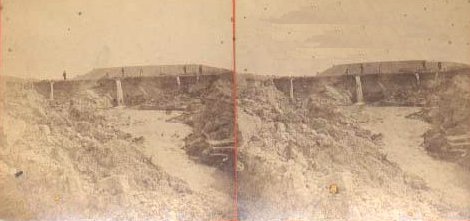
Placer mining area on the Snake River
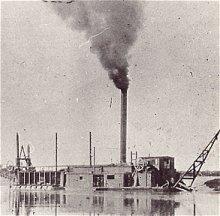 He takes up placer mining on the shores of the Snake. ERB condemns
the lust for gold as demeaning by which I suppose he condemns his brothers
for the folly of operating gold dredges on the river. Like Secor,
but on a grander scale, they too had labored mightily only to end up broke
as expenses overtook rewards.
He takes up placer mining on the shores of the Snake. ERB condemns
the lust for gold as demeaning by which I suppose he condemns his brothers
for the folly of operating gold dredges on the river. Like Secor,
but on a grander scale, they too had labored mightily only to end up broke
as expenses overtook rewards.
Ogden and Mag are good pals but their pasts
prevent them from confessing their love. Then they run into Pursen
and his wife who was Secor's former fiancee. Right behind them comes
that wide ranging Chicago Police force. Doarty shows up in Idaho
to pinch June?Mag, this time for the murder of John Secor.
One is reminded of the Chicago officers who
followed Billy Byrne and Bridge of 'Out There Somewhere' from Chitown all
the way to El Paso before the boys escaped across the border. Even
then the Chifuzz was waiting for them in Brownsville when they returned.
My advice is: Never commit a crime in Chicago although it has been rumored
that many do.
Then begins one of the more improbable endings
in literature. Saved by the correspondence school sleuth, Sammy,
who is now a full fledged detective Secor suggests to June that now they
can be married.
June is horrified at marrying the son of the
father she had been married to.
Stop! Stop, that's not
the way it was, that's just the way we thought it was because we didn't
ask the right questions along the way.
"My father!" (Secor)
exclaimed. "do you mean that you do not know- that John Secor was
not my father?'
"Not your father?"
June was no more surprised than I was.
I'd been reading along pretty carefully and I thought John was Ogden's
father. Talk about the luck of Horatio Alger, listen to this:
I was the foster son
of John Secor's brother. When he died I went to live with the John Secors,
and after the death of their only son I entered Mr. Secor's office, taking
the place of the son he had lost, later inheriting the business."
What an incredible stroke of luck for a little orphan boy. Secor's
brother even adopted him or he couldn't have been a Secor. We used
to to hear stories like this around the orphanage but nobody ever believed
them. I certainly didn't
Foster son of the brother? Genetically
safe anyway you look at it. Are all the obstacles now removed?
Not yet.
There's still the lingering doubt Ogden may
have abut her loyalty concerning the safe and skull crackers. Well,
rah, rah, rah Correspondence school. Up steps Detective Sammy:
"That's what I wanted
to tell you about, Miss Lathrop,' he said excitedly. "It wasn't
her at all" he went on, turning to Secor. "It was that smooth scoundrel
of a Stickler. I was hiding under his filing cabinet when he tried
to make Miss Lathrop go out with him, and I heard her turn him down.
Then I followed him, for I was just studying to be a detective then and
I had to practice every chance I got. He went straight to Abe Farris's
saloon and there I saw him talking low and confidential-like to a couple
of tough lookin' guys for about two hours. He handed one of 'em a
slip of paper, explaining what was on it. I couldn't see it, but
from what happened after I knew it held the combination to your safe for
I seen the robber that was shot when he was put on trial, and he was one
of the guys that Stickler met in Farris's. I was so scared I didn't
dare tell nobody."
OK. Are all the obstacles removed?
Ogden turned toward June
with a faint smile. "You see," he said, "that one by one your defences
are reduced- aren't you about ready to capitulate?"
"I guess there is no
other way," she sighed, "but it seems that the world must be all awry when
hope of happiness appears so close within my grasp."
So ends the tale which from its inception to
its end bracketed five others must of which had sequels carrying ERB's
though processes beyond this one.
One of them, The Mucker, evolved into
Out
There Somewhere and then into Bridge And The Oskaloosa Kid which
resolved a number of psychological problems for ERB including he Anima
and Animus with which this story is concerned.
In this, as in many Burroughs' stories the
hero is a prince who through adverse circumstances becomes a pauper then
redeems himself in the end. In this manner ERB retells his vision
of his own life which begins as a little prince. He is disinherited
by John the Bully as well as his father transferring him from school to
school. His attachment to his first school, Brown, remained with
him throughout his life. His wife, Emma, was a classmate at Brown.
After years of tribulations ERB was realizing
his potential as a prince. This book was begun in his anno mirabilis
of 1913. He began writing it with only the prospect of success before
him. He was about to take his first extended visit to California
so that the story was begun in Chicago and completed in San Diego after
had successfully negotiated the trials of 1913.
Like June, after many bitter years of disappointments,
he could hardly believe such happiness was his.
As in Bridge and The Kid the characters
represented by his Anima and Animus are reunited. Both had failed
him miserably on that street corner with John the Bully. His years
of failure were undoubtedly caused by this fracture of both sides of his
personality. As they were degraded so was he. Thus he represents
his Anima as a prostitute who had started out poor but honest while his
Animus goes through a period of extreme degradation before he finds himself.
This theme would be repeated very closely ten
years later in his Marcia
Of the Doorstep with the roles of June and Secor reversed.
Thus ERB struggled with this problem of his
Anima and Animus throughout his life. Farris's may be seen as a first
failed attempt at reconciliation. Bridge And The Oskaloosa Kid
actually resolved the problem but apparently not to his complete satisfaction.
The follow through must have been missing. He might have needed some
outside guidance. Marcia Of the Doorstep must have been a
futile retelling as it was never published anywhere during his lifetime.
Farris's is not a great success as a novel
but it is nonetheless a good story. There would have been little
pulp writing any better. Once again ERB crammed the ending.
If he had put as much care into the end as he did the beginning he would
have had a pretty decent novel.
Whatever its shortcomings I like the book.
A better glimpse of the Chicago of the period would be hard to find.
I am as entranced by slang and speech patterns as was ERB, thus the novel
has other attractions to me than story. I felt like I was there.
I recommend you go there too. Read the book if you haven't.
Read with care and attention to detail, there are a lot of hidden beauties.


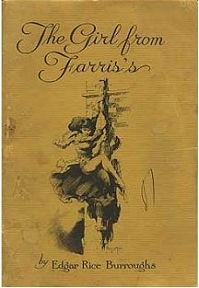
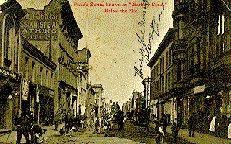
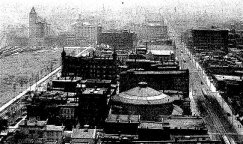
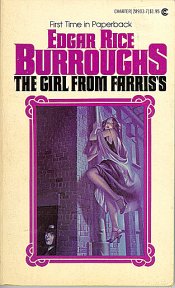
![]()
![]()
![]()
![]()

![]()